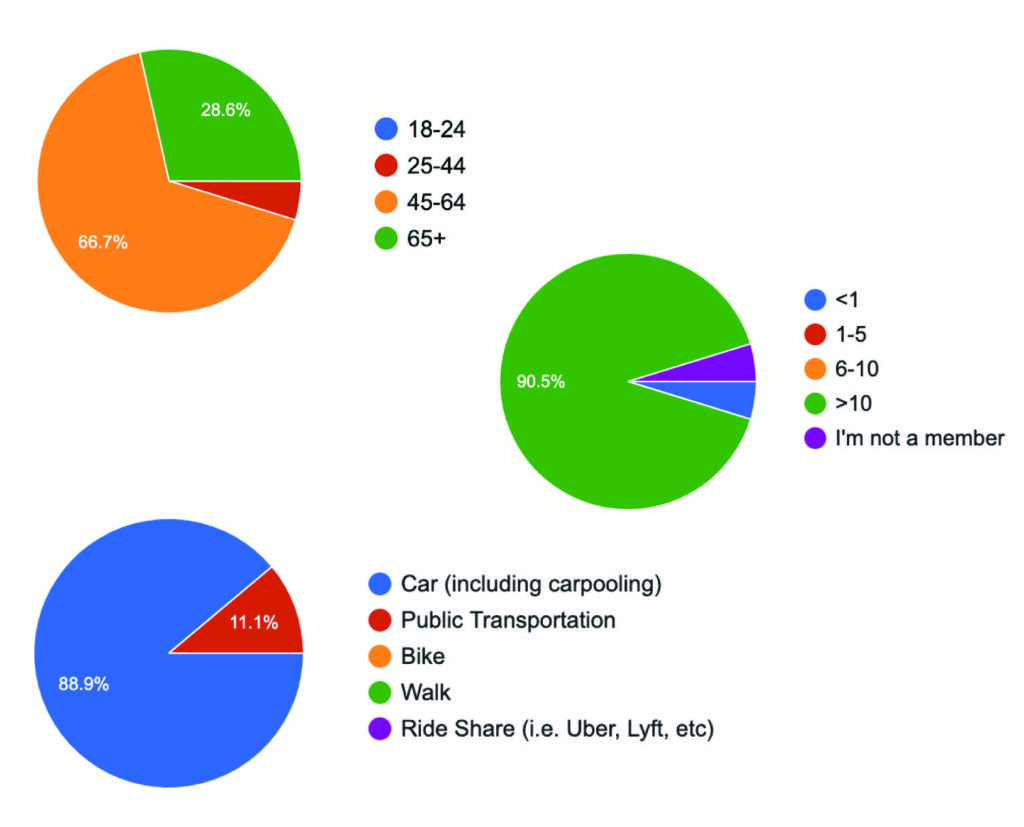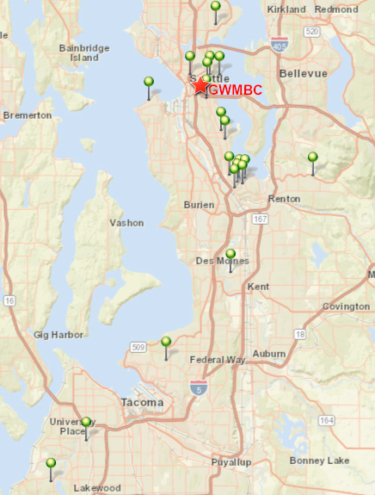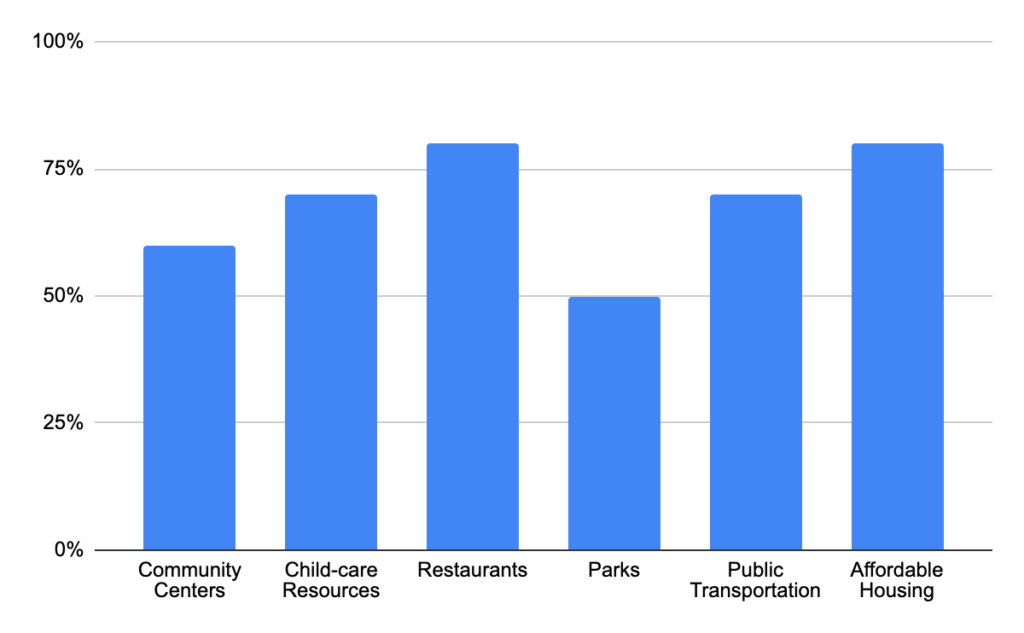Central District Community Engagement
The Nehemiah Initiative finds it especially critical to receive community input on future decisions. During Spring 2020, the Nehemiah Initiative in partnership with the University of Washington’s College of Built Environments Urban Planning and Design studio initiated a series of community engagement activities with various stakeholders as a means to further advance the Nehemiah Initiative and gather pertinent information directly from community members. This studio initiated two surveys: The first survey for pastors of churches formerly located in Seattle’s Central District and the second survey for congregation members of Goodwill Missionary Baptist Church, one of the Central District’s historically Black churches. These two groups were chosen because of their historical knowledge, lived experience, and close relation to the Central District.
The surveys were implemented with the purpose of helping to prevent further displacement of Black churches and their congregation members, preserving the historic and cultural Black community of the Central District, and identifying opportunities for resilience with current and future congregation members/churches. The survey for former pastors was created with the intention of gathering information on why their churches left the Central District. The survey for Goodwill Missionary Baptist Church congregation members was created with the intention of gathering information on understanding members’ relationships to the Central District and how the evolving community has affected them.
Findings
The survey for Goodwill Missionary congregation members consisted of 23 questions, aimed at directly understanding the impact of the Central District and its evolving environment on the members of the church. This understanding was achieved by asking questions regarding members’ perception of the Central District, their reasons for leaving the Central Distinct, their reasons for a return, and how they envision the future of the Central District. Though currently still ongoing, there have been 21 responses.
Who Took the Survey
Currently, there are 21 responses. More than two-thirds of the respondents are within the 45-64 age range, have been a congregation member of Goodwill Missionary Baptist Church for more than 10 years, and commute to church by car.

Perception of the Central District
- Of the 21 respondents, 66.7% said their cultural and economic needs are not met within the Central District. When asked to explain further, more than 80% of the responses reinforced the theme of changes in the neighborhood.
- Cultural elements, specifically those that identify with the Black community, were mentioned by 14 different respondents. The Black community and Black-owned/African American-owned businesses, including restaurants, cultural arts, shopping, health, beauty shops, and churches, were described as being “push[ed] out, forced out, no longer there, and gone.” One respondent specifically connected the loss of culture as “essential to the economic development of [Black] community.” Three respondents believed that specifically, economic elements have led to a lack of affordability and economic “deserts” that have forced them to go elsewhere. Gentrification, marijuana shops (specifically Uncle Ike’s), traffic, and high-rises were all specific elements that were called out to be associated with negative changes in the neighborhood. These negative factors related to the changes in the neighborhood were also the reasons why 14 respondents felt that the Central District was unwelcoming.

Map of GWMBC Congregation Members’ Locations
- Moreover, it is important to note that these very same sentiments correlate directly to where members stay. As you can see here from the map, while the church itself sits in the heart of the Central District in Seattle, the congregation members themselves occupy areas all over the Puget Sound region, with the majority of respondents living in between Renton and Tukwila. Some of them even live as far as the south Tacoma area.
- Despite the negatives, the church and Black-owned businesses seem to play a huge role in creating a feeling of community. The word “church” was mentioned among 12 respondents as a “highlight of [their] lives every week and the necessity to ensure that Black churches remain in the Central District.
The Road to Envisioning the Future
- Three main themes – affordability, change in neighborhood/culture, and personal reasons such as age and family – seem to recur throughout respondents’ reasons for leaving the Central District. Of the 12 responses, 33% relocated due to a decrease in affordability, while 25% relocated due to a change in neighborhood (demographics, zoning, income levels, etc). Of the remaining, 16% relocated due to family issues. One respondent noted “My family moved out of the Central District initially because the Fair Housing Act of 1968 provided the possibility of living in other parts of Seattle. As an adult, I have not been able to afford to live in Seattle, even though I have worked in Seattle for nearly 37 years.”
- When asked “Would you return to the Central District?,” 3 of the 12 respondents answered simply no, while 9 said yes with conditions. These conditions mimicked the major themes presented above. In fact, every respondent whose answer was yes with conditions stated that they would return to the Central District if more affordable housing was implemented in the area. Thus, it seems as if affordability would be the driving force behind returning many congregation members back to the community.
- “Black-owned business” was mentioned among 10 respondents. Finally, the pride of “Black community” and the concept of “togetherness” are the significant favorite features of the Central District, showing the importance and need of Black presence and ownership in the Central District.
- We asked, “How important are certain resources for enhancing community life in the Central District?” 80% of respondents felt restaurants and affordable housing were most important; with child care resources and public transportation following behind.

Take our Survey!
Our initial responses have provided so much valuable insight, and we would love for more people to participate!
If you identify as a pastor whose church was formerly located in the Central District, please take this survey.
If you identify as a congregation member of any Black church in Seattle’s Central District, please take this survey.
